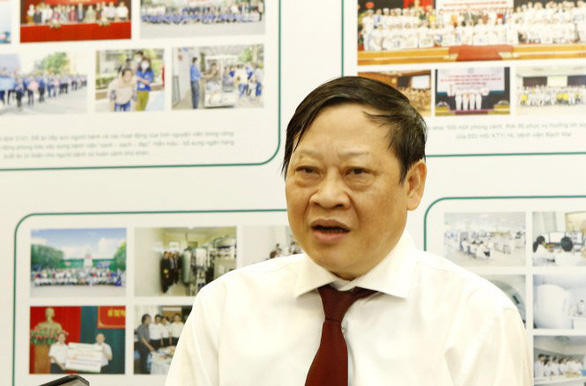.jfif) Opinion
Opinion


|
| Nguyễn Viết Tiến |
Nguyễn Viết Tiến, deputy health minister, talks to Tuổi trẻ cuối tuần (Youth Weekend edition) about the concerns raised over a two-year pilot programme that would grant full autonomy to the four largest public hospitals in the country – Bạch Mai, Việt Nam-Germany, K (in Hà Nội) and Chợ Rẫy Hospital (in HCM City). This would mean they would no longer receive allocations from the State budget, but have more freedom in decision-making in various matters that previously needed approval from the health ministry.
Are there mechanisms in place to check the practice of over-prescription or other issues when the hospitals are autonomous units?
For reputable hospitals and doctors, the prescriptions given must be exactly what the patients need, otherwise they will certainly lose their reputation and status.
I am myself a doctor, I would never want to prescribe medications or diagnostic tests more than necessary for a patient. If the hospital is not capable of performing a certain test then doctors should refer the patients to another hospital, all within the patients’ best interests.
I think the public should not be alarmed over the newly autonomous status granted to a select few public hospitals and fears that this will give them freedom to do whatever they want. This is impossible in the health sector, for every hospital will have within itself an internal system of checks and balances.
As you said, the internal controls seem to rely more on each individual’s belief and conscientiousness. But it should be mentioned that all the public hospitals on autonomy trial here receive more than 20,000 patients a day with many more in inpatient treatment.
Usually, the hospitals must submit their plans or projects to the health ministry for review and approval. When the hospitals become autonomous, chair of the hospital’s management board will be the one to consider the plans and make the decisions.
But that doesn’t mean this decision-making will be arbitrary. For example, the management board often comprises 7-11 members, with one of them serving as deputy head or head of a department in the health ministry. So in case abnormal issues emerge, the official could still easily report to the health ministry and the ministry has the right to conduct inspections any time into the hospital.
Medical fees and other hospital fees of course will not be adjusted wildly by the autonomous hospitals, because the hospital’s leaders will be held accountable. There are legal documents available to govern this issue.
The only difference when the public hospitals become autonomous is now they no longer have to go through lengthy approval processes at the health ministry to do what they need, even though they will do it with the money they have at hand. Now they could make fast decisions and implement projects in a timely manner, which serves as a clear indication of the Government’s efforts to streamline administrative procedures.
What are the benefits patients can receive from public hospitals’ autonomy?
Patients will surely benefit from this. Let’s say, for decrepit hospital rooms that need repairs or expansion, instead of having to wait for the authorised officials to give their go-ahead, now the hospital’s management board can just green light the repairs to begin right away.
Other issues, which took time before, now will be done much faster.
Do you think the hospitals are ready for the changes?
They certainly are. The public hospitals themselves have put forward the proposal for autonomy to the health ministry and the Government.
Public hospitals’ autonomy at this stage remains in trial, but in the future, it might be implemented on a wider scale because prior to the decision, the authorities have already carefully reviewed all aspects of the model, otherwise, why would they allow the pilot in the first place?
Granting autonomy to public hospitals, in my opinion, could resolve a large part of the current administrative system, but it couldn’t be the be-all and end-all. We would continue to look for ways to address the remaining issues.
What do you consider the limitations of the autonomy model, given that many hospitals are still not really convinced of the new approach?
If the hospital’s leadership are committed to innovations, bringing benefits to the whole community, and promoting the hospitals’ strengths, then surely, the hospitals will grow strongly. But if the leadership is greedy, reckless in spending and arbitrary in decision-making then it will be disastrous.
Even without autonomy like before, there could still be hospitals’ directors who abuse their power.
Previously, the vice director of a central-level hospital is one that must be approved of and appointed by the health ministry, however, he or she might not fit in well with the hospital’s operations or the office culture there so they couldn’t perform their duties as well as expected.
But now, under the pilot autonomy, hospitals’ management boards could make decisions regarding their personnel, up to the vice director post.
So in summary, granting autonomy to hospitals will award them with much more freedom, not only in terms of construction or infrastructure upgrades, but also in terms of human resources and working environment.
The hospitals can now make all the decisions, as long as they are responsible, objective, fair and in line with the law. — VNS




